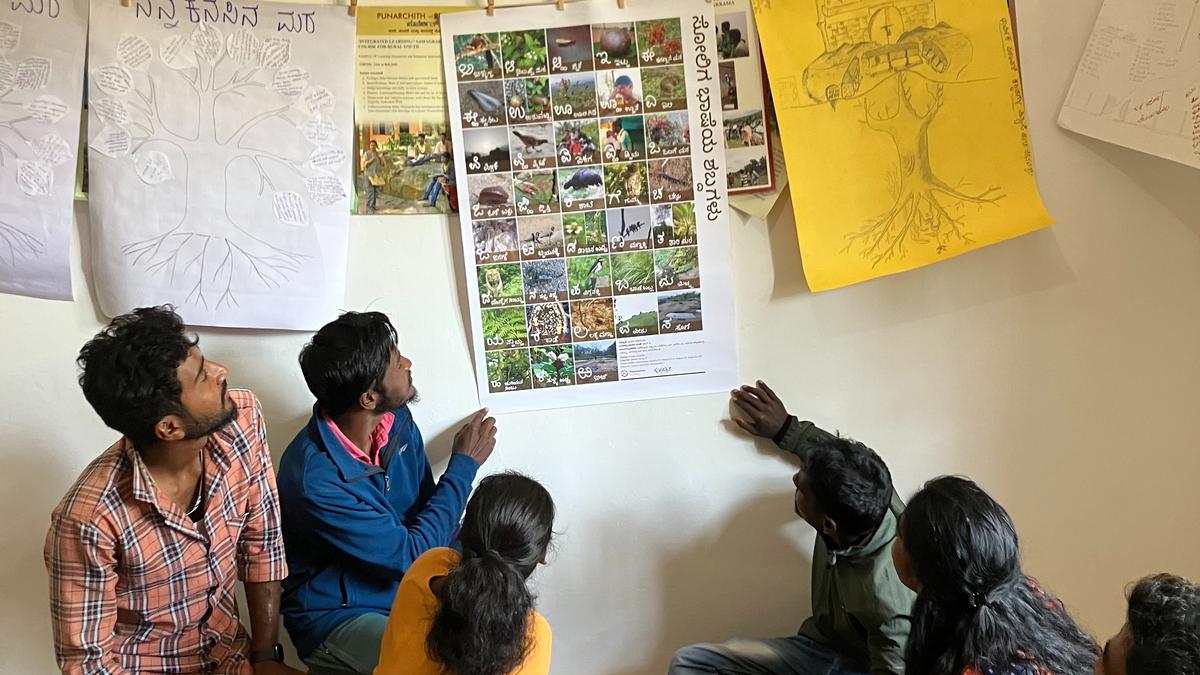
International Mother Language Day | Here’s how Karnataka’s Soliga community is protecting its language from erasure
The Hindu
The Soliga, also spelt Solega or Sholaga, are a group of indigenous, forest-dwelling people found mostly in Tamil Nadu and Karnataka
A language getting lost is an entire culture getting lost,” says Jadeswamy, a senior member of Karnataka’s Soliga community that lives in BR Hills in the southern part of the State. It is something Jadeswamy sees happening around him all the time. “The forest is endangered, animals are affected, the climate is changing, and our language is going away,” says the long-time employee of Ashoka Trust for Research in Ecology and the Environment’s field station here.
In India, one of the most linguistically diverse countries in the world, around 197 languages are now endangered while over 200 languages have gone extinct in the last 50 years. If not actively preserved, the Soliga language could be in danger of extinction too, believe the community’s elders.
It is why Jadeswamy thoroughly approves of ‘Soliga Sounds’, a chart developed by the youth of his community. It shows the sounds of the Soliga language, written in the Kannada script (since the Soliga do not have one). “If we want to keep our culture, we need to make an effort,” says Jadeswamy, who actively contributed to the chart.
Released last year, the pictorial is part of Aadhi, a programme facilitated by the Punarchith Collective and supported by the Rainmatter Foundation that seeks to revive intergenerational sharing of knowledge and culture.
Punarchith’s Samira Agnihotri, who has been working on this initiative along with Lakshmi M. from the Soliga community, hopes that the chart will help people realise that the Soliga language is a distinct one. “Indigenous languages are often oral with no script. Perhaps that is why it is so easy to dismiss or ignore them,” she says. “It is not just about archiving it, like a photo album that you look at once in a while,” says Agnihotri, also one of the founding and administrative members of the Coexistence Consortium. “It will only sustain if used continuously. It is not documentation to archive. It is documentation to revive.”
The Soliga, also spelt Solega, are a group of indigenous, forest-dwelling people found mostly in Tamil Nadu and Karnataka. Around 40,000-odd Soligas live in Karnataka, mostly in the Chamarajanagar district, with many families coalescing in small settlements in and around BR Hills. In 2011, they became the first tribal community living inside a tiger reserve to get legal rights to the forest. The Soliga language is a Dravidian one, closely related to Kannada, and often referred to by the community as ‘namma Kannada’ (our Kannada), ‘namma baase’ (our language), or ‘Soliga baase’, says Aung Si, a linguist who has been working with the community since 2008, even developing a dictionary in the Soliga language.
Like many indigenous people around the world, the Soligas’ unique traditions and culture, including language, are fast-eroding, catalysed by several factors, including changing lifestyles, exposure to the outside world, limited access to forests and their products, social hegemonies, ecosystem degradation and cultural alienation among the youth. “I think the main cause of language attrition is lifestyle change and increased contact with the outside world,” says Aung, also one of the Aadhi programme’s key advisors. While development is not bad in itself, perhaps even inevitable, “in small, marginalised communities that struggle with poverty and have no resources to document or preserve their culture, it can easily lead to a loss of language and traditional knowledge,” he says.

The girl, who was admitted to Aster CMI Hospital with alarming breathlessness and significant pallor, was diagnosed with Wegener’s Granulomatosis (now known as Granulomatosis with Polyangiitis or GPA), a rare autoimmune condition that causes spontaneous bleeding in the lungs, leading to acute respiratory failure.

ACB files case against IPS officer N. Sanjay in Andhra Pradesh. The official is accused of manipulating the tender processes for awarding contract for development and maintenance of AGNI-NOC portal, and conducting awareness meetings for SC/STs. It is alleged that the total value of properties stolen, or involved in the case is estimated at ₹1,75,86,600.









